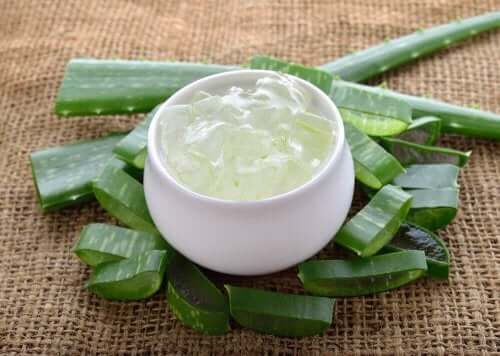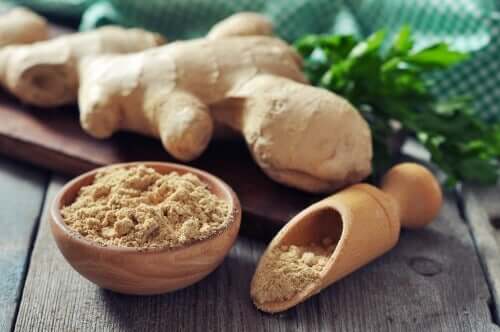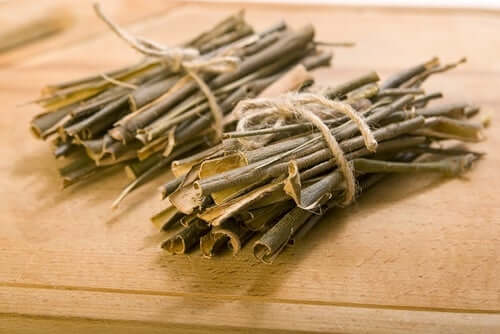Five Medicinal Plants to Manage the Pain of Rheumatoid Arthritis

Medicinal plants have been used since ancient times as a complement to treat the pain of rheumatoid arthritis. While the treatment of this disease includes several drugs, certain anti-inflammatory plants can help control your symptoms.
In fact, increasingly more patients are interested in these remedies, which are often considered effective in helping manage severe pain episodes. However, in many cases, there’s still a lack of scientific evidence supporting the benefits attributed to them. Therefore, before consuming them, you should consult your doctor to determine possible interactions with medications or side effects.
With this in mind, now we’re going to delve deeper into this disease and the herbal remedies that can help.
What is rheumatoid arthritis?

Rheumatoid arthritis (RA) is an autoimmune disease that causes joint pain and deterioration. Often, it affects both sides of the body and develops gradually. Thus, if a joint is compromised, the same articulation of the opposite side will also be affected.
Due to the evolution of its symptoms, experts consider the disease chronic. Many patients even become unable to do their daily tasks. Also, pain can manifest intermittently, with alternating severe pain and relief episodes.
Symptoms of rheumatoid arthritis
The symptoms of rheumatoid arthritis may be mild or severe, depending on the degree of progression of the disease. People usually can avoid pain crises if they’re diagnosed on time. Thus, although the pain initially disappears, it’s advisable to consult your doctor.
Its clinical manifestations include:
- Joint pain, on one or both sides of the body.
- Joint swelling.
- Stiffness.
- Loss of joint function.
- Prolonged fatigue.
You should also read: Relieve Rheumatoid Arthritis with Medicinal Remedies
Medicinal plants to manage the pain of rheumatoid arthritis
Natural remedies made from medicinal plants are good complements to manage the pain of rheumatoid arthritis. Although the evidence of their action is based on anecdotal data, many patients claim to have improved after consuming them.
Thus, if your doctor considers that there are no downsides, they can be a good choice to improve the treatment of the disease. Most importantly, you need to first make sure that there are no side effects or interactions.
1. Aloe vera

Aloe vera is one of the most popular medicinal plants in the treatment of diseases. Known since ancient times due to its nutritional benefits, it’s still valid as an alternative remedy for hundreds of ailments.
Among these benefits, it’s important to highlight that its calming effect. Thus, the external application of the gel that it contains may help manage the pain of rheumatoid arthritis. Also, it stimulates circulation and prevents skin problems, such as psoriasis and allergies.
How to use it
- Extract a generous amount of aloe vera gel and gently massage it onto your joints.
- Repeat treatment every night before bed.
2. Cat’s claw to treat the pain of rheumatoid arthritis
The Arthritis Foundation believes that cat’s claw may be beneficial in controlling inflammation and pain. Due to its anti-inflammatory and analgesic properties, cat’s claw can help manage the pain of rheumatoid arthritis. In fact, according to the Arthritis Foundation, one study showed that it can help decrease the inflammation this disease causes.
How to use it
- There are several ways to harness the benefits of this plant. First of all, you can find it in extracts or ointments for external use.
- Furthermore, you can also make tea with one teaspoon of the plant in a cup of boiling water. Drink twice a day.
- Finally, you can purchase it in tablets or capsules, which you must take following their instructions.
3. Ginger

One of the best natural treatments to reduce the symptoms of arthritis is undoubtedly ginger. Because it contains a significant amount of gingerol, it has an anti-inflammatory effect that reduces swelling, stiffness, and pain. Also, studies on its effect on patients with RA yielded promising results.
How to use it
- The traditional way to consume this spice is through tea. It’s very easy to make. All you have to do is pour a teaspoon in a cup of boiling water. Drink two to three times a day.
- It’s also available in supplements and tablets.
- Likewise, you can use its oil topically.
Discover: Treat Your Rheumatoid Arthritis And Get Your Health Back
4. Green tea
Although it became popular due to its slimming properties, green tea is also a good ally to manage the pain of rheumatoid arthritis. This is due to its antioxidant content and anti-inflammatory compounds that help protect joints.
How to use it
- You can take it as a tea or in tablets or tinctures. The dosage should be controlled by a doctor.
5. Willow bark to treat the pain of rheumatoid arthritis

This medicinal plant is one of the best-known plants to fight inflammation. Its extracts contain painkillers and anti-inflammatory agents that help relieve pain. Therefore, it’s been used since ancient times to treat joint problems, headaches, or neck pain, among others.
How to use it
- First of all, you can prepare a tea by pouring a teaspoon of the plant into a cup of water. Ideally, you should drink it twice a day.
- The second option is to purchase tablets or supplements (following dosage instructions).
Caution: You shouldn’t abuse it. An overdose can cause rashes and other manifestations of inflammation. You shouldn’t take it if you’re allergic to aspirin or are being treated with anticoagulants.
A final note
Herbal medicine has had more acceptance among doctors in recent years. Thus, some may suggest certain plants as a complement to help manage arthritis pain. However, these don’t replace prescription drugs. Also, you must first assess their potential effects with a doctor.
All cited sources were thoroughly reviewed by our team to ensure their quality, reliability, currency, and validity. The bibliography of this article was considered reliable and of academic or scientific accuracy.
- Choudhary, M., Kumar, V., Malhotra, H., & Singh, S. (2015). Medicinal plants with potential anti-arthritic activity: Journal of Intercultural Ethnopharmacology. https://doi.org/10.5455/jice.20150313021918
- Sandoval, M., Okuhama, N. N., Zhang, X. J., Condezo, L. A., Lao, J., Angeles, F. M., … Miller, M. J. S. (2002). Anti-inflammatory and antioxidant activities of cat’s claw (Uncaria tomentosa and Uncaria guianensis) are independent of their alkaloid content. Phytomedicine. https://doi.org/10.1078/0944-7113-00117
- Funk, J. L., Frye, J. B., Oyarzo, J. N., Chen, J., Zhang, H., & Timmermann, B. N. (2016). Anti-inflammatory effects of the essential oils of ginger (Zingiber officinale Roscoe) in experimental rheumatoid arthritis. PharmaNutrition. https://doi.org/10.1016/j.phanu.2016.02.004
- Singh, R., Akhtar, N., & Haqqi, T. M. (2010). Green tea polyphenol epigallocatechi3-gallate: Inflammation and arthritis. Life Sciences. https://doi.org/10.1016/j.lfs.2010.04.013
- Chrubasik, J. E., Roufogalis, B. D., & Chrabasik, S. (2007). Evidence of effectiveness of herbal antiinflammatory drugs in the treatment of painful osteoarthritis and chronic low back pain. Phytotherapy Research. https://doi.org/10.1002/ptr.2142
- Shara, M., & Stohs, S. J. (2015). Efficacy and Safety of White Willow Bark (Salix alba) Extracts. Phytotherapy Research. https://doi.org/10.1002/ptr.5377
- Clínica Mayo. Artritis Reumatoide. (2019). Recuperado el 13 de octubre de 2020. https://www.mayoclinic.org/es-es/diseases-conditions/rheumatoid-arthritis/symptoms-causes/syc-20353648#:~:text=La%20osteoartritis%2C%20la%20forma%20m%C3%A1s,y%20causa%20dolor%20e%20hinchaz%C3%B3n.
This text is provided for informational purposes only and does not replace consultation with a professional. If in doubt, consult your specialist.








